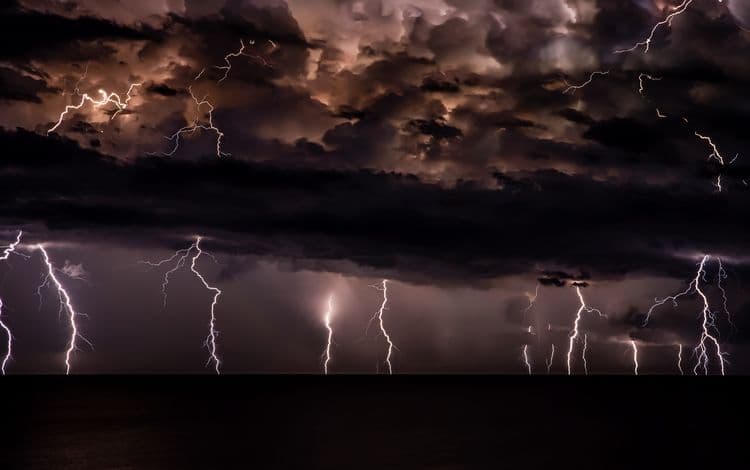Financially, from an insurance standpoint, in terms of business taxes, you probably have a handle on how to protect your business. But what about when it comes to natural disasters…Are you prepared to be without power, to lose data, to be essentially crippled for weeks, if not months after something like an earthquake or hurricane for instance? If you aren't prepared, you could be in for a very catastrophic experience—one that essentially forces your company to close. Especially for those in areas prone to natural disasters: California, where earthquakes were particularly pronounced this year; Florida, and the southern East Coast bracing for hurricane season; wherever you may be located that is threatened by the volatile forces of nature, you need to have a plan in place.
Below are five steps you can take to prepare your company for a natural disaster—you can't afford to wait.
1. Have an emergency operations plan for before, during and after the disaster strikes
What if the natural disaster struck right now? Does your office space have emergency kits in place? What about afterward—if communications are down—how do you contact employees? Will they be able to work from home if needed? These are all questions that have to be directly answered and included in your emergency operations plan.
Sit down with your team, really think about how prepared you are as a company to handle emergencies. Your emergency operations plan should address the following:
The question of leadership…Who's in charge during an emergency scenario such as this? Who delegates to employees, whether those employees are located on or off-site?
What happens if your office space, warehouse or any other such structure is damaged in a natural disaster? Are there other options available? Is working remotely something to consider?
Communication for any company is key. That said, what happens if phones and email are down? You also want to ensure that you have the most updated contact information for all of your employees.
How about as far as evacuation is concerned? Make sure everyone is aware of the safest route out of the building or to a secure location. You probably want to practice tornado and earthquake drills, among other procedures.
Then, of course, consider client communication. You want your customers to know that you're still there—are there ways you can update clients and thus keep them in the loop regarding your status?
You want to work on this emergency plan as a team. Get employee feedback, and then be sure to review it with each member of the company. It's crucial that everyone is on board, comfortable with the plan, and most importantly, that they understand what they need to do and what consequently, is going to happen.
2. Back up that data
This goes for any time of the year, in any situation, not necessarily just when a natural disaster is about to strike. One thing you can do is to store documents off-site. Make copies when you need them. And then, of course, you want to have a safe storage space for things such as tax forms, payroll, and insurance papers.
Many businesses are going to cloud-based storage solutions. You should be backing up all of your electronic documents this way. This ensures that regardless of what happens, you have your vital information on hand wherever you may end up and thus a better chance of keeping things running along smoothly.
3. Have your insurance squared away
Do you know what exactly is and/or is not covered if an emergency occurs? Meeting with your insurance agent/advisor before anything of this nature happens will allow you to better plan for what follows. Look at your policy limits, understand what will be required once you do file a claim post-emergency. You may want to rethink some of your coverages as well to ensure that you do have enough insurance to cover any replacements costs.
4. Communicate with…everyone!
From employees to customers, to stakeholders in the company, in the lead up to a natural disaster, it's imperative to make sure that everyone is on the same page and knows what is happening. Again, this should be a part of your emergency operations plan. Crisis communication needs to be at the heart of your natural disaster approach.
Alert your customers: Maybe you post some messages on social media. You might also consider sending out a press release relevant to your company's natural disaster protocol. Give your clients contact info that they may need should they have to get a hold of you for some reason. You want to alert them regarding any impact that a storm, hurricane or earthquake has on your business, and also let them know as soon as you're back up and running.
Communicate with your team: At all points during and after the disaster, keep in close contact with members of your team. You want to make sure that they're safe; if they need to relocate you want to know how they're proceeding. You may also opt to establish a disaster fund—a short term stopgap that can be used to pay employees and any necessary expenses.
5. Regroup and keep going
Small businesses that are affected by major weather events, like hurricanes and floods for example, sometimes are down for extended periods, depending on how badly hit their region. For some, they never recover and ultimately have to close their doors. However, if you do have plans in place, if you take the time to prepare, you will have hopefully have a fighting chance and be able to resume business operations while forging ahead.
If your business is in need of funding, this is where First Union Lending can help. Call today!
